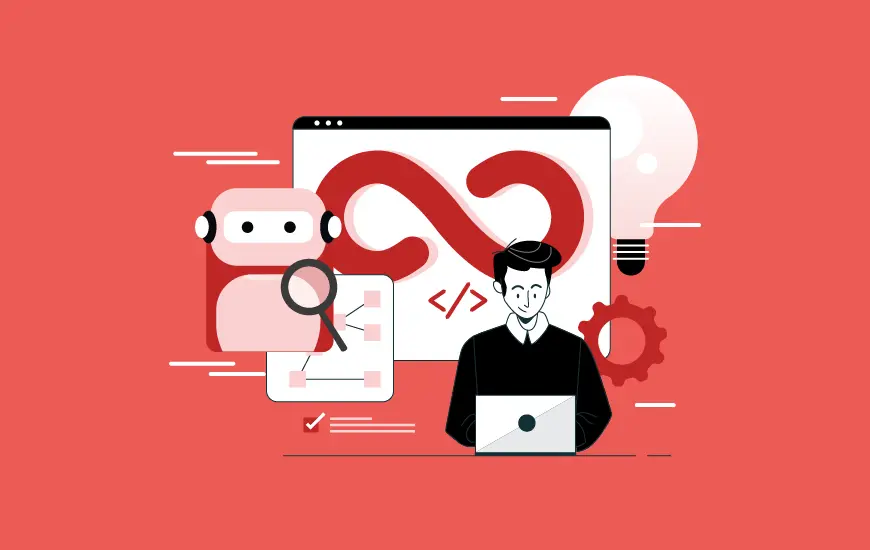- How ChatGPT Works for DevOps Processes and Workflows
- Error Detection and Resolution
- Faster Documentation
- Real-Time Translation
- Benefits of Using ChatGPT in DevOps Workflow
- Improved Efficiency and Productivity
- Reduced Errors and Downtime
- Enhanced Collaboration and Communication
- Cost Savings
- ChatGPT Use Cases for DevOps
- Create Programming Code
- Refine Your Research Capability
- Incident Management
- Continuous Integration/Continuous Deployment (CI/CD)
- Infrastructure Management
- Collaborative Knowledge Sharing
- ChatGPT+ Code Interpreter = DevOps Excellence
- Real-World Examples of Companies Using ChatGPT for DevOps
- Bing
- Nvidia
- Shopify
- Capital One
- Improving DevOps Efficiency with ChatGPT: Challenges and Limitations
- Limited Domain-Specific Knowledge
- Inefficiency in Understanding Natural Language
- Security and Privacy Concerns
- Future Potential of Chatbot Integration with DevOps Workflow
- Unleash the Power of ChatGPT for DevOps with Appinventiv
- FAQs
Since its launch on November 30, 2022, ChatGPT has rapidly emerged as a revolutionary AI language model, captivating the world with its remarkable capabilities and transformative potential.
This AI-powered chatbot is meticulously crafted using NLP techniques and ML algorithms, enabling it to swiftly comprehend the intricacies of human language and excel at a multitude of tasks. From answering generic research inquiries and crafting persuasive speeches to translating languages and generating computer codes, ChatGPT has garnered attention and solidified its position as a game-changer in today’s digital landscape.
However, its impact extends far beyond these achievements. In the world of coding, where collaboration, efficiency, and innovation are of utmost priority, ChatGPT has redefined the DevOps workflow. Just as Microsoft-owned GitHub revolutionized code hosting and version control, ChatGPT stands robust to offer a similar paradigm shift for DevOps engineers, helping them summarize complex codes and create a starting template for a specific coding task. Even GitHub is overhauling its Copilot system to integrate the ChatGPT-4 model and bring voice and chat support to its AI pair programmer.
Unsurprisingly, by harnessing the power of ChatGPT for DevOps, developers can propel their DevOps practices to new heights. In simple terms, OpenAI’s ChatGPT, an AI language model, serves as a catalyst for DevOps professionals, unveiling a world of possibilities for them to enhance workflow and boost productivity.
Let’s dive deeper to understand the potential of ChatGPT to enhance DevOps workflow.
How ChatGPT Works for DevOps Processes and Workflows
DevOps teams often have to deal with a heap of tasks with insufficient bandwidth. That is why they are always eager to embrace any latest technology that can help them automate their regular work routines and enable them to focus on more critical areas of operation. Here, ChatGPT can be a great savior, helping the DevOps teams as a virtual assistant to automate various processes.
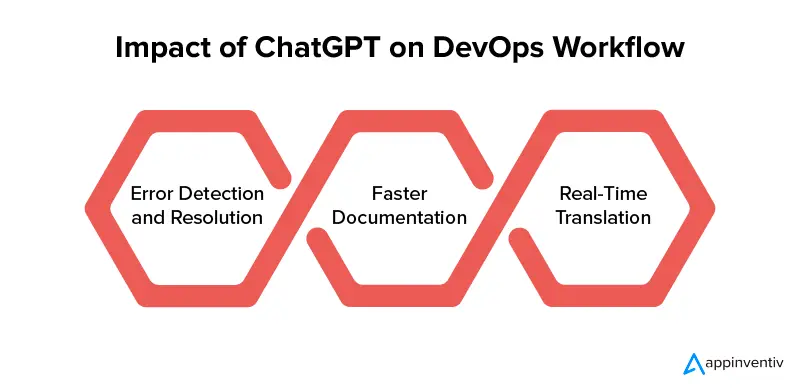
Here’s a detailed overview of how ChatGPT impacts the primary DevOps functions.
Error Detection and Resolution
ChatGPT can discover underlying errors in code, logs, or configuration files; while suggesting the best approaches to fix those errors. It even creates patches automatically, which speeds up the resolution process and reduces downtime.
Faster Documentation
The DevOps team needs to maintain a high volume of data and create documentation which can be a complex and challenging process, particularly when the deadlines are tight. ChatGPT can help automate and speed up the documentation process, ensuring it stays accurate and up-to-date.
Real-Time Translation
With the post-pandemic shift towards hybrid and remote work settings, working with global teams has been more complicated than ever. It poses not only language hurdles but also distance barriers.
But ChatGPT for DevOps can act as an intelligent intermediary between the different silos, regardless of their language and location. It facilitates better collaboration between DevOps teams by offering real-time translations, reducing diversity-driven challenges, and ensuring smooth communication.
Benefits of Using ChatGPT in DevOps Workflow
ChatGPT is a valuable tool for DevOps engineers looking to increase efficiency and enhance workflows. This AI-Powered Chatbot for DevOps can provide several benefits. Here are some examples of how ChatGPT can benefit DevOps teams.
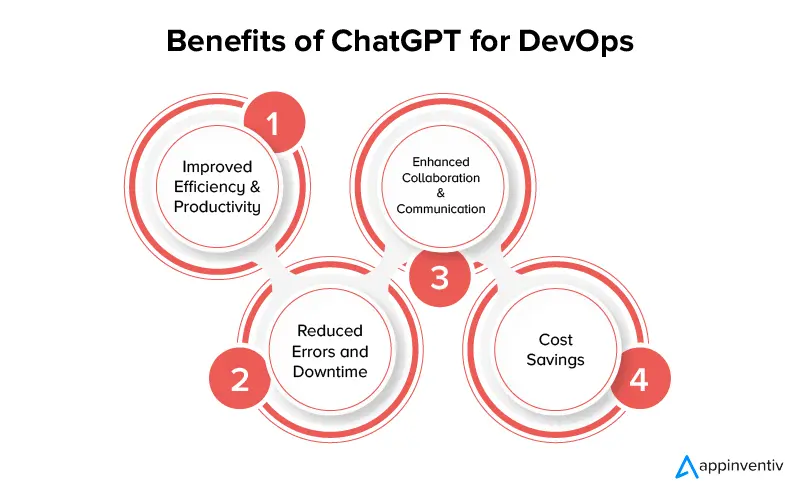
Improved Efficiency and Productivity
ChatGPT can automate routine tasks and facilitate communication between different silos involved in the DevOps workflow. It leads to improving efficiency, saving time, and boosting productivity. For instance, ChatGPT automatically notifies team members about an underlying issue, suggests a resolution, schedules a deployment, or runs tests. It saves the valuable time of DevOps engineers and allows them to focus on more critical tasks.
Reduced Errors and Downtime
ChatGPT helps reduce the risk of human errors and downtime in the DevOps workflow by automating manual tasks and minimizing human intervention. For instance, ChatGPT can automatically run tests, check for code quality, and perform security scans, minimizing the risk of errors and vulnerabilities in the code. This leads to more accurate and faster results.
Enhanced Collaboration and Communication
Smooth communication and better collaboration between the different teams are the driving force behind the successful operation of DevOps workflow, and ChatGPT facilitates it. ChatGPT can be a virtual assistant for DevOps teams, advising for various tasks and providing real-time support. It helps improve communication between the team members, as they can count on this AI model to resolve common issues.
By bringing all the team members to a single platform to communicate, collaborate and exchange information, AI in DevOps workflow helps remove the communication barriers and improve overall efficiency. Additionally, ChatGPT enables team members to stay informed on the current status of various tasks and projects.
Cost Savings
By automating routine tasks, reducing time, saving resources to perform certain tasks, and improving DevOps efficiency, the ChatGPT tool also helps minimize labor costs and improve the overall ROI of the DevOps workflow. Also, ChatGPT saves costs by reducing the risk of errors and downtime, as detecting issues lately and fixing the same lead to additional expenses.
ChatGPT Use Cases for DevOps
ChatGPT can be used in various ways to enhance DevOps workflows. Some of the critical use cases of ChatGPT for DevOps are as follows.
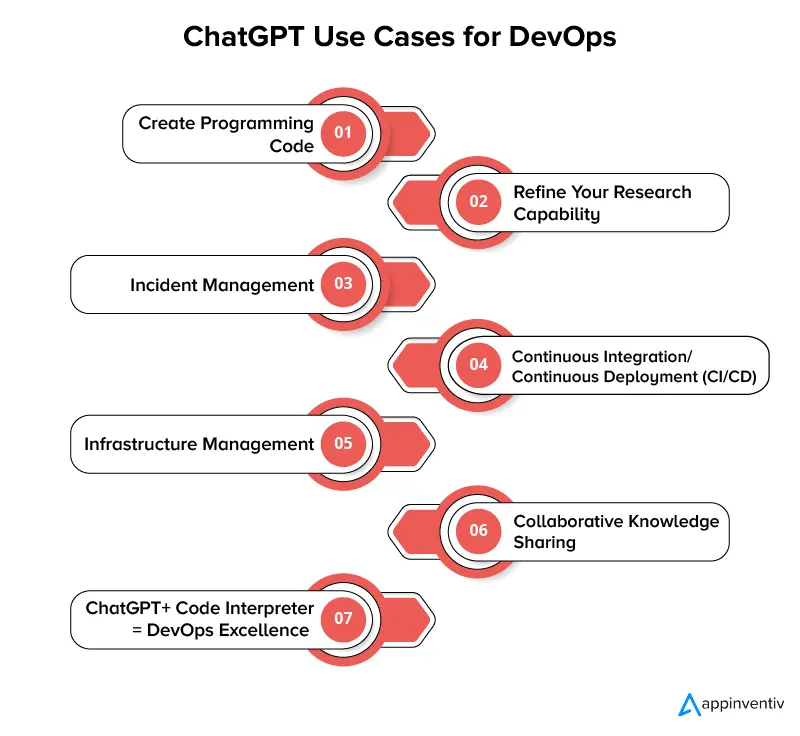
Create Programming Code
While ChatGPT is not proficiently trained to create codes, it can help in the process. You just need to provide a detailed prompt describing your desired programming language and functionality of the code snippet. ChatGPT will analyze the given prompt using ML algorithms and generate a programming script template matching the description.
For instance, if you give the prompt, “Produce a Python script template for deploying a web application to a server,” ChatGPT will give you a code template that you can adjust as per your needs.
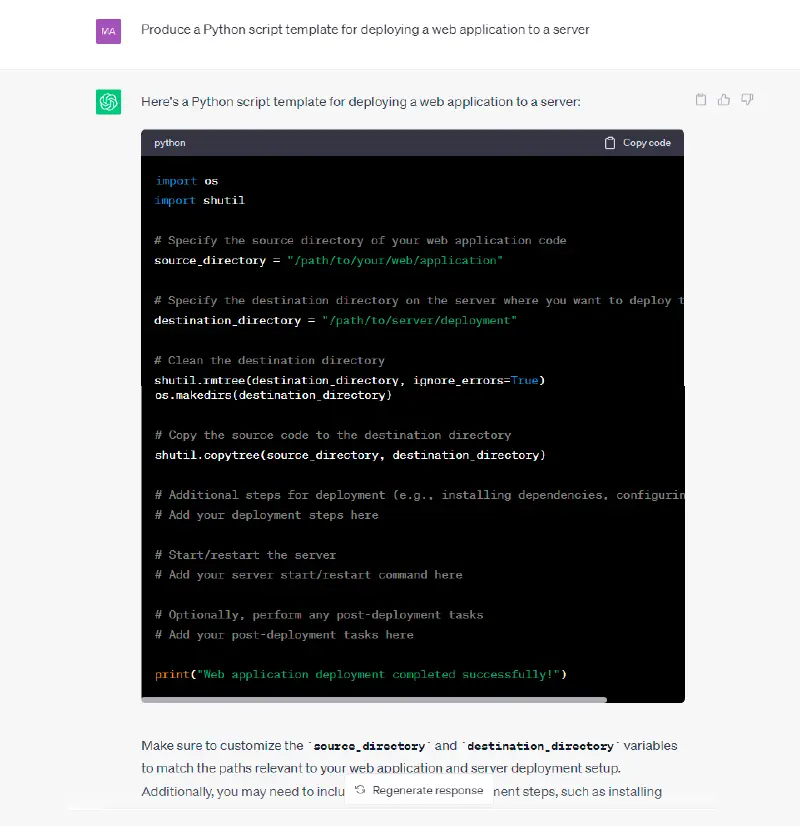
Refine Your Research Capability
DevOps teams can significantly improve their research efficiency and boost productivity by utilizing ChatGPT. This AI language model provides valuable insights on any topic, tool, or methodology.
So, you can ditch your old practice of exploring a topic using different keywords and browsing through several search engines, and adopt ChatGPT to get deep and detailed explanations of a DevOps-related topic in minutes.
Incident Management
ChatGPT can help identify incidents and automate incident management workflows by analyzing logs and providing real-time notifications and feedback to DevOps teams. In addition, chatGPT can also help troubleshoot by detecting underlying issues and suggesting step-by-step guidance to resolve the same, reducing downtime and minimizing the impact on end-users.
Continuous Integration/Continuous Deployment (CI/CD)
Chatbot integration for DevOps workflow can be used to automate the CI/CD process by running tests, building artifacts, and deploying code to different environments. It also helps ensure that code is integrated and deployed consistently, reducing the time-to-market and improving overall product quality.
Infrastructure Management
Another critical use case of ChatGPT for DevOps workflow is the automation of infrastructure management tasks, such as managing deployments, provisioning and configuring resources, and monitoring resource utilization. It helps save the time and effort required to manage infrastructure and improve overall system performance.
Collaborative Knowledge Sharing
Optimizing DevOps with ChatGPT can help team members to collaborate on tasks, share information, and provide feedback on system performance. It will ensure that knowledge is shared and preserved across the organization, improving communication and team efficiency.
While these are just a few, ChatGPT can have various other use cases that can improve DevOps workflows. By leveraging the full potential of this AI-powered Chatbot, the DevOps team can enhance overall system performance and reliability.
You may like reading: The breakthrough that is ChatGPT: How much does it cost to build?
ChatGPT+ Code Interpreter = DevOps Excellence
ChatGPT’s recent launch, Code Interpreter, can be a valuable tool for DevOps professionals as it provides them with a versatile platform for executing and testing code snippets, automating repetitive tasks, and facilitating smooth collaboration among developers and operations teams.
For instance, it can be highly beneficial for working with Infrastructure as Code (IaC), as it allows for executing and validating code written in Python, Bash, JavaScript, and other interpreter languages. It also helps create and maintain CI/CD pipelines
Additionally, code interpreter enables DevOps teams to analyze logs, performance metrics, and other data-related tasks. It also aids in automation and scripting tasks, which are the core of DevOps practices. Lastly, it empowers DevOps teams to ensure code quality by providing them with a convenient environment.
Real-World Examples of Companies Using ChatGPT for DevOps
The use of conversational AI in DevOps workflow has been trending worldwide in recent years. It is why many businesses across industries are leveraging this AI tool to revolutionize their operation and drive innovation. Here are real-world examples of organizations embracing ChatGPT to unlock unprecedented efficiency.
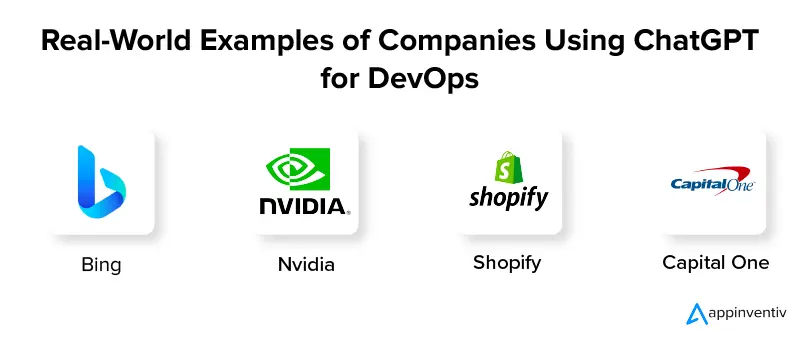
Bing
Microsoft’s Bing, a pioneer in search engine technology, is one of the early adopters of ChatGPT, who collaborated with OpenAI to harness its limitless capabilities. In a groundbreaking move, Bing unveiled its ChatGPT-powered search engine in February 2023, ushering in a new era of intelligent and interactive search experiences for users worldwide.
Nvidia
Nvidia, a leading manufacturer of GPUs (graphics processing units), is harnessing the full potential of ChatGPT to update and transform its code review process.
Before implementing this AI model into the system, Nvidia empowered it through rigorous training so that it could adeptly understand the prompt of natural language code and provide valuable feedback on code quality, security, and performance. This strategic implementation of ChatGPT for DevOps has eventually offloaded the mundane tasks of DevOps team while simultaneously improving the overall code quality within the organization.
Shopify
A leading e-commerce platform, Shopify has enabled its shopping applications with ChatGPT. The platform leverages the power of this AI model to improve productivity for store owners, which helps them write SEO-friendly blogs, draft emails, write codes, and generate product descriptions. Moreover, the AI-based app also gives personalized recommendations to buyers, enhancing their shopping experience.
Capital One
Capital One, a renowned financial institution, is on a mission to transform its incident management process by bringing simplicity, ingenuity, and humanity to banking using ChatGPT.
In this transformation journey, Mark Mathewson, (Executive Vice President – Divisional CIO at Capital One) is making a move to update and streamline the basic software and hardware infrastructure of the company. This venture is driven by the adoption of AI approaches and equipping DevOps engineers with its best practices, resulting in next-gen automation that exceeds business expectations.
This is how leading companies of different industries are harnessing the power of ChatGPT to automate and elevate their DevOps practices. It is now time you should consider embracing ChatGPT to meet changing market needs and stay competitive in today’s digital landscape.
Improving DevOps Efficiency with ChatGPT: Challenges and Limitations
The limitless abilities of ChatGPT have quickly made it a popular tool to gain 100 million users in just 60 days, and it marked the dawn of AI-driven DevOps automation with ChatGPT. But despite its widespread adoption, this AI tool has certain limitations and challenges that can impact its performance in the DevOps workflow. Let’s discover some common challenges engineers face in optimizing DevOps with ChatGPT and how to overcome those issues.
Also Read: DevOps Adoption And Implementation: From Application To Enterprise
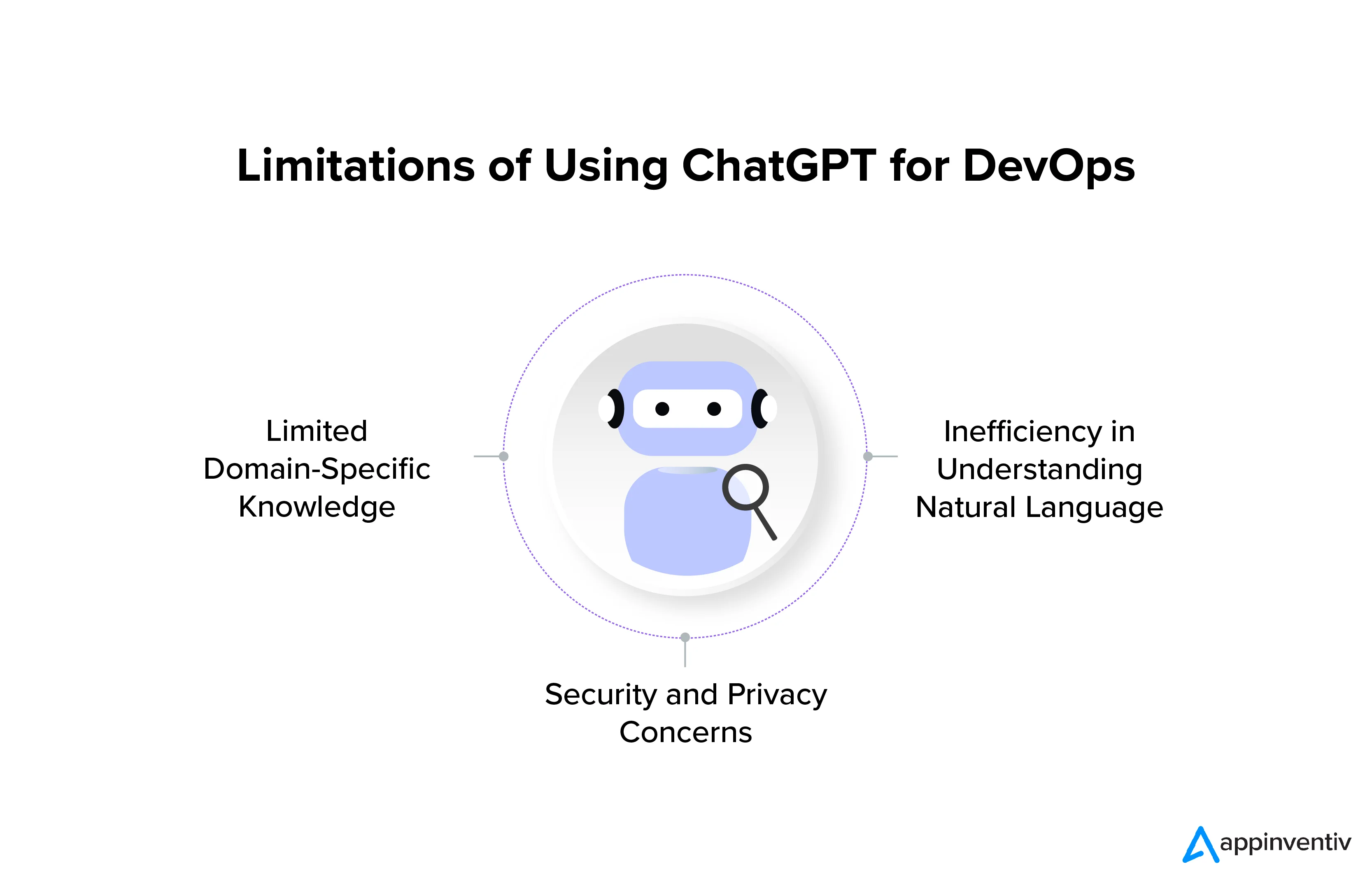
Limited Domain-Specific Knowledge
Challenge: While ChatGPT is profoundly trained with a large amount of data, it cannot match the level of knowledge that humans have in their area of expertise, such as the specific terminologies or jargon used in a particular domain, like real estate, healthcare, finance, etc. The AI tool cannot generate relevant responses to the questions related to that domain. Also, it cannot stay abreast of the recent changes and developments in specific fields.
Resolution: Customize the ChatGPT application by giving it domain-specific training. It will enable the AI tool to understand the domain-specific terminology, complexity, and context. Accordingly, it will generate more accurate and relevant responses.
Inefficiency in Understanding Natural Language
Challenge: Even if ChatGPT is proficient in natural language processing, it cannot always grasp the meaning behind specific sentences or understand the subtle nuances of human tone. Often ChatGPT falls flat in interpreting natural language and understanding context, especially sarcasm and humor.
Resolution: Natural language processing (NLP) is a complex process that also involves understanding the nuances and subtleties of human language. Therefore, it’s vital to train ChatGPT on diverse datasets that include various types of natural language expressions, terminology, and syntax used in DevOps.
[Also Read: How to build a chatbot with deep NLP?]
Security and Privacy Concerns
Challenge: Security and privacy concerns are other significant limitations in using ChatGPT in DevOps workflow. ChatGPT has access to a large amount of sensitive data or confidential information, such as customer information, login credentials, etc. which need to be protected from cyber theft and other feasible crime.
Resolution: To address this challenge, DevOps engineers must implement strict data security measures, such as encryption, regular access control, audits, and monitoring. They should also follow all regulatory compliances, standards, and protocols to avoid all risks.
Also Read: Measuring DevOps Success in the Enterprise with DORA Metrics
Future Potential of Chatbot Integration with DevOps Workflow
ChatGPT has a wide range of use cases in DevOps. With its ability to process natural language and generate human-like responses, ChatGPT can automate various tasks in DevOps, from infrastructure management to incident management.
By automating these tasks and leveraging the power of natural language processing, ChatGPT can help reduce human intervention, minimize errors, improve communication and collaboration, and save DevOps teams time.
As the ChatGPT use cases for DevOps continue to evolve, its potential in DevOps will only increase, making it a valuable addition for businesses looking to enhance their workflows.
Unleash the Power of ChatGPT for DevOps with Appinventiv
Appinventiv provides DevOps consulting services and solutions with a powerful toolset that helps kickstart your transition to automated DevOps workflow. We have a team of trained DevOps consultants who run a comprehensive analysis of your business needs and help you achieve the desired outcome.
Our highly skilled consultants stand by you throughout the DevOps workflow with the best practices, smooth collaboration, and cutting-edge tools, thus assisting you in leveraging the full potential of ChatGPT by creating a new AI language model or customizing the existing one. It helps DevOps teams run smooth workflows with little to no effort and ensures customization and a high level of security at scale.
From implementing the best practices further backed by AI in DevOps to standardizing processes for infrastructure deployment, Appinventv can do it all. Think of us as your one-stop DevOps teammate that will enable your organization to unlock the full potential of ChatGPT and simplify complex DevOps workflow. We simultaneously help reduce the burden on your DevOps team while ensuring a simple and secure AI-driven DevOps automation with ChatGPT.
Interested to discover more about the possibilities that ChatGPT-integrated DevOps can bring to your business? Contact us now for all your queries and requirements, and our team will get back to you shortly.
FAQs
Q. How can ChatGPT be used in DevOps workflows?
A. ChatGPT for DevOps helps automate routine tasks, reduce errors, enhance efficiency, improve communication and collaboration, and maximize overall performance. Some specific ChatGPT use cases for DevOps include automated CI/CD, infrastructure management, incident management, and collaborative knowledge sharing.
Q. How can ChatGPT be used to improve DevOps efficiency?
A. The natural language processing and machine learning capabilities of ChatGPT help streamline workflows and improve efficiency. So, improving DevOps efficiency with ChatGPT can easily be done by automating routine tasks, providing real-time notifications and alerts, and improving communication and collaboration among team members. It helps ensure that any underlying issues are detected quickly and addressed efficiently.
Q. What is the future of DevOps with ChatGPT?
A. The future of DevOps with ChatGPT is incredibly bright as this AI language model helps automate the process, streamline workflows, and enhance collaboration, revolutionizing the way businesses function and drive innovation.


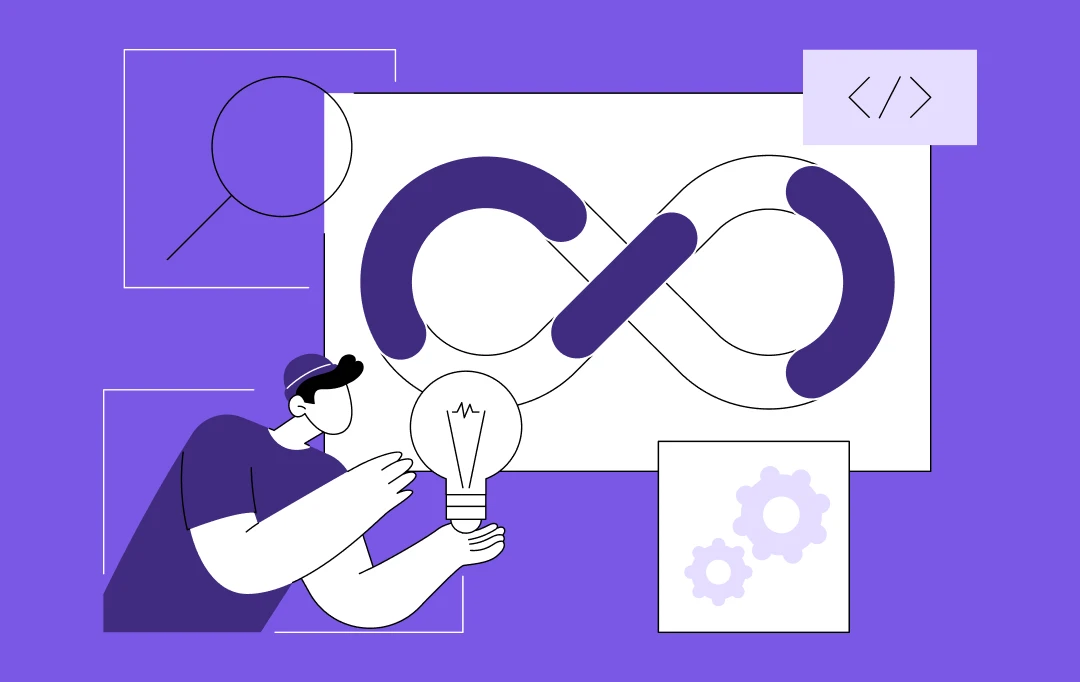
DevOps Maturity: Why It Matters and How Business Leaders Can Achieve It
Key takeaways: DevOps maturity is a business growth driver—not just a tech upgrade. Organizations evolve through five stages, from ad-hoc practices to AI-driven automation. Mature DevOps teams excel in automation, collaboration, observability, and security. Strategic frameworks like CALMS, DORA, and VSM guide transformation effectively. Achieving maturity requires cultural shifts, skilled teams, and continuous measurement. Let’s…

Why DevOps Outsourcing is the Smartest Move for Enterprises and How to Get it Right?
Enterprise IT teams today are under siege. Market demands are shifting faster than ever, customer expectations are sky-high, and the pressure to deliver secure, high-quality software at speed has never been more intense. But here’s the kicker - most in-house teams are stuck firefighting legacy infrastructure issues, managing complex toolchains, and navigating organizational silos that…

DevOps Automation: How to Approach the Business-Critical Functionality
A product release delayed by weeks. A security patch stuck in approval cycles. A minor code change that breaks production. These challenges aren’t new, yet they remain all too common in enterprises trying to balance speed with stability. The pressure to innovate faster while ensuring reliability has led many organizations to DevOps. But as businesses…






